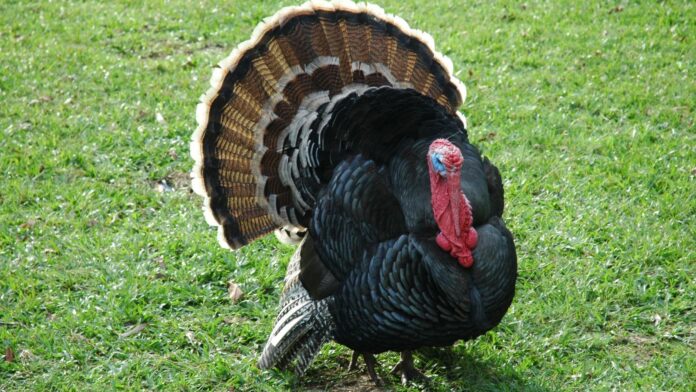Raising turkeys for eggs has emerged as an attractive, self-sufficient lifestyle choice but knowing where to start can be overwhelming. Studies show that turkey eggs have higher nutrient content than the usual chicken eggs we consume.
This comprehensive guide will walk you through everything you need to know about this profitable venture, from choosing the right breed to creating the ideal egg-laying environment and proper nutrition.
Ready to embark on a journey toward sustainable living? Let’s dive in!
Key Takeaways
- Raising turkeys for eggs offers higher nutrient content and a unique, flavorful taste compared to chicken eggs. Turkey eggs are packed with protein and omega-3 fatty acids, making them a nutritious addition to your diet.
- Choosing the right turkey breed is essential for egg production. Opting for heritage breeds like Bourbon Red or Narragansett ensures consistent egg size and high productivity.
- Creating the ideal environment involves providing secure housing, proper lighting and temperature, adequate nesting boxes, and maintaining cleanliness. These factors contribute to healthy turkeys that lay high-quality eggs consistently.
- Feeding and nutrition play a crucial role in optimal egg production. A balanced diet rich in proteins, vitamins, minerals, along with access to fresh water and free-range opportunities supports healthy hens and strong egg formation.
Benefits of Raising Turkeys for Eggs
Raising turkeys for eggs offers higher nutrient content and a unique, flavorful taste compared to chicken eggs.
Higher nutrient content in turkey eggs
Turkey eggs are a powerhouse of nutrition, often overlooked in favor of their more popular counterparts – chicken eggs. These nutrient-rich delicacies can provide an exceptional health boost to your diet if included regularly.
While they are similar to chicken eggs, turkey eggs generally have higher concentrations of essential nutrients like protein and omega-3 fatty acids which aid muscle growth and brain development respectively.
Given the healthier nutritional profile, raising turkeys for egg production can be a smart choice for those interested in off-grid living where self-sufficiency is key. With proper care techniques which experts at Freedom Ranger would agree with, you can ensure a steady supply of these nutritious gems right from your backyard! Turkeys not only offer high-quality meat but also lead the way in providing nutrient-dense food sources through their eggs, making them worthy considerations for your backyard flock!
Unique and flavorful taste
Turkey eggs are renowned for their unique and flavorful taste, making them a delightful addition to any off-grid living menu. Unlike chicken eggs, turkey eggs have a richer flavor profile with hints of gamey notes that elevate your culinary creations.
The larger size of turkey eggs also means more yolk, which contributes to the creaminess and richness in both savory and sweet dishes. Additionally, due to the varied diet turkeys enjoy when allowed to forage freely, their eggs may showcase subtle nuances influenced by the plants and insects they consume.
So whether you’re looking to enhance your breakfast omelets or experiment with exciting new recipes, incorporating turkey eggs into your off-grid lifestyle promises a taste sensation like no other.
Choosing the Right Turkey Breed for Egg Production
When choosing a turkey breed for egg production, it is important to select heritage breeds that are known for their high productivity and consistent egg size.
Selecting heritage breeds
When choosing the right turkey breed for egg production, it is important to consider selecting heritage breeds. Heritage turkeys are known for their ability to lay eggs consistently and have excellent maternal instincts.
Some popular heritage breeds include Bourbon Red, Narragansett, and Royal Palm. These breeds not only produce delicious eggs but also contribute to preserving genetic diversity in turkeys. By raising heritage breeds, you can support sustainable farming practices and help maintain these unique varieties for future generations.
Considering factors like egg size and productivity

When it comes to raising turkeys for eggs, considering factors like egg size and productivity is essential. Different breeds of turkeys have varying egg sizes, with some producing larger eggs than others.
Understanding the specific needs and requirements of each breed can help you make an informed decision about which one to choose for your flock.
Productivity is another important factor to consider when selecting a turkey breed for egg production. Some breeds are known to lay more eggs throughout the year, while others may only lay during certain seasons.
Assessing the productivity of different breeds will help ensure a consistent supply of turkey eggs.
Creating the Ideal Environment for Turkey Egg Production
Creating the perfect environment for turkey egg production involves ensuring secure and comfortable housing, providing proper lighting and temperature, offering adequate nesting boxes, and maintaining cleanliness and hygiene.
Providing secure and comfortable housing
One of the most important aspects of raising turkeys for eggs is providing them with secure and comfortable housing. Turkeys need a coop that offers protection from predators, extreme weather conditions, and diseases.
The coop should have sturdy walls and a strong roof to withstand any external threats. It’s essential to ensure proper ventilation inside the coop to maintain optimal air quality for the turkeys.
Moreover, providing enough space per turkey is crucial to prevent overcrowding and promote their overall well-being. By creating a safe and comfortable environment for your turkeys, you can ensure that they are healthy and able to lay high-quality eggs consistently.
Ensuring proper lighting and temperature
Maintaining the right lighting and temperature for your turkey flock is crucial to their well-being and productivity. Turkeys require a consistent light-dark cycle of about 16 hours of light and 8 hours of darkness.
Providing natural sunlight or using artificial lighting sources can ensure they receive the recommended amount. As for temperature, turkeys are sensitive to extreme cold or heat, so it’s important to keep their environment between 65-75 degrees Fahrenheit during the day and slightly cooler at night.
This will help maintain their comfort, prevent stress-related issues, and promote optimal egg production. By carefully regulating lighting and temperature, you can create an ideal environment for your turkeys to thrive in off-grid living situations.
Offering adequate nesting boxes
Providing adequate nesting boxes is an essential aspect of raising turkeys for eggs. Turkeys have a natural instinct to lay their eggs in safe and secure spots, so having proper nesting boxes ensures that they feel comfortable and protected during the egg-laying process.
When setting up your turkey coop, make sure to include enough nesting boxes for each female turkey, as overcrowding can lead to stress and decreased egg production.
Turkeys prefer dark and quiet spaces for their nests, so it’s important to create a cozy atmosphere within the nesting boxes. Line them with clean straw or wood shavings to provide a soft and warm surface for the turkeys to lay their eggs on.
Additionally, ensure that the nesting boxes are located in an area of the coop that offers privacy from other animals or disturbances.
Maintaining cleanliness and hygiene
Maintaining cleanliness and hygiene is crucial when raising turkeys for eggs, not only for the health of the birds but also to ensure the safety and quality of the eggs. By keeping their housing clean and free from dirt, feces, and excess moisture, you can greatly reduce the risk of disease transmission and bacterial contamination.
Regularly disinfecting their living area with safe cleaning agents helps eliminate harmful germs that could compromise both your turkeys’ well-being and the integrity of their eggs. Additionally, practicing good hygiene habits by washing your hands thoroughly before handling eggs will further minimize any potential cross-contamination risks.
Following these simple yet essential practices will help promote a healthy environment for your turkey flock while ensuring that your delicious homegrown turkey eggs are safe to consume or hatch into adorable poults.
Feeding and Nutrition for Egg-Laying Turkeys
Feeding egg-laying turkeys requires providing a balanced diet rich in essential nutrients for optimal egg production.
Choosing a balanced diet
To ensure optimal egg production, it is crucial to provide your turkey flock with a balanced diet. Turkeys require a diverse range of nutrients to support their reproductive system and egg-laying capabilities.
A well-balanced diet for turkeys should consist of high-quality poultry feed that contains the right mix of proteins, carbohydrates, fats, vitamins, and minerals. Additionally, offering fresh fruits and vegetables as supplements can provide essential vitamins and minerals while enhancing their overall health.
It is important to note that turkeys are natural foragers and allowing them access to pasture or forage areas can contribute to a more varied diet. By providing your turkeys with a nutritious and balanced diet, you’re ensuring optimum egg production and healthy birds in your off-grid setup.
Providing essential nutrients for egg production
To ensure optimal egg production, it is crucial to provide essential nutrients to your turkey hens. These nutrients play a significant role in the overall health and productivity of your flock.
A well-balanced diet rich in proteins, vitamins, and minerals is essential for egg-laying turkeys. Proteins are particularly important as they provide the building blocks for egg formation.
Including high-quality poultry feed or incorporating ingredients like soybean meal or fish meal in their diet can help meet their protein requirements. Additionally, supplementing with calcium-rich sources such as crushed oyster shells or ground limestone aids in forming strong eggshells.
Vitamins and minerals also contribute to healthy eggs and overall bird health. Including a vitamin supplement formulated specifically for laying hens ensures they receive all the necessary nutrients.
Minerals like phosphorus and manganese are crucial for bone strength and reproductive function.
Remember that providing fresh water at all times is vital for maintaining hydration levels, egg quality, and overall wellbeing of your turkeys. Offering free-range opportunities or access to pasture allows them to graze on greens which further enhances the nutritional profile of their eggs.
Offering free-range and forage opportunities
One of the many advantages of raising turkeys for eggs is that they thrive in an environment where they can freely roam and forage. Turkeys are natural foragers, meaning they enjoy searching and pecking at the ground to find insects, seeds, plants, and other small creatures.
This behavior not only keeps them engaged and active but also contributes to their overall health and well-being. By allowing your turkeys access to a wide range of outdoor spaces, you provide them with opportunities to exercise their natural instincts while finding nutritious food sources on their own.
This free-range lifestyle enhances the flavor and nutrient content of their eggs, making them even more appealing to enthusiasts looking for a sustainable and self-sufficient food source. So if you’re interested in off-grid living or simply want to provide your turkeys with a fulfilling life, consider incorporating free-range options into your turkey egg production setup.
Collecting and Handling Turkey Eggs
Establishing a regular egg collection routine is essential to ensure the freshness and quality of turkey eggs. Clean hands should be used when handling the eggs, and any soiled or cracked eggs should be discarded.
Proper cleaning and storage techniques are important for maintaining egg hygiene, while monitoring fertility levels can help in deciding whether to incubate the eggs for hatching or use them for consumption.
Establishing a regular egg collection routine
Regularly collecting turkey eggs is essential for maintaining their freshness and maximizing the chances of successful incubation. To establish a smooth egg collection routine, it is recommended to check your nesting boxes at least twice a day, preferably in the morning and evening.
This ensures that you don’t miss any freshly laid eggs and provides an opportunity to remove any broken or dirty ones promptly. Remember that turkey eggs are delicate, so handle them with care to avoid cracking or damaging the shells.
By consistently monitoring your hens’ laying habits and collecting their eggs diligently, you can enjoy a steady supply of nutritious turkey eggs for consumption or incubation purposes.
Proper cleaning and storage of eggs
Maintaining cleanliness and proper storage of turkey eggs is essential for their quality and safety. After collecting the eggs, it’s important to gently clean any dirt or debris off the shells using a soft cloth or brush.
Remember to avoid washing the eggs with water as this can remove their natural protective coating.
Once cleaned, store the turkey eggs in a cool and dry place, ideally at temperatures between 45-50°F (7-10°C). Placing them with the pointed end down in an egg carton helps prevent moisture loss and keeps them fresh for longer.
It’s best not to wash or refrigerate the eggs until you’re ready to use them as this can negatively affect their taste and texture.
When storing turkey eggs, be mindful of their freshness. A simple way to check is by doing a float test – if an egg floats on top of water instead of sinking, it may not be fresh anymore. Additionally, always mark each egg with its collection date so you can prioritize using the oldest ones first.
Monitoring egg fertility and incubation options
To ensure successful turkey egg production, monitoring the fertility of eggs and exploring incubation options is essential. The fertility of turkey eggs can be determined by examining whether a developing embryo is present when candling the eggs.
This process involves shining a light through them to reveal any signs of growth. If an egg is infertile, it will appear clear or have a small yolk without any visible veins.
When it comes to incubation options, you have two main choices: natural or artificial methods. For those interested in off-grid living, relying on natural incubation may be preferable as it allows turkeys to hatch and raise their young naturally.
However, if you want more control over the hatching process or need to increase your flock size quickly, artificial incubation with an incubator can be a viable option.
Remember that regardless of which method you choose, maintaining optimal temperature and humidity levels throughout the incubation period is crucial for successful hatching. It’s also important to turn the eggs regularly during both natural and artificial incubation to prevent deformities in developing embryos.
Conclusion
In conclusion, raising turkeys for eggs can be a rewarding and sustainable venture. With the right breed selection, proper care techniques, and attention to nutrition, you can enjoy the benefits of higher nutrient content in turkey eggs and their unique taste.
Whether you’re considering backyard turkey farming or commercial production, this comprehensive guide provides valuable tips and techniques for success. So why not start your own flock of turkeys today and experience the joy of fresh eggs straight from your backyard? Happy turkey farming!
FAQs
1. What are the benefits of raising turkeys for eggs?
Raising turkeys for eggs can provide several benefits, including a sustainable source of fresh and nutritious eggs, potential income from selling surplus eggs or breeding stock, and the opportunity to connect with nature and learn about animal husbandry.
2. What are some important tips for raising turkeys for egg production?
Some essential tips for successful turkey egg production include providing a suitable housing environment with adequate space and ventilation, ensuring proper nutrition through a balanced diet that includes calcium-rich feed, regularly monitoring the health of the turkeys and providing necessary veterinary care when needed, and implementing effective predator control measures to protect the birds.
3. What techniques can be used to maximize turkey egg production?
To maximize turkey egg production, it is important to select breeds known for their high egg-laying capabilities, maintain optimal lighting conditions (around 16 hours of light per day), properly manage nesting areas by keeping them clean and comfortable, collect eggs frequently to prevent hens from trying to brood them, and ensure proper incubation conditions if hatching is desired.
4. Can I raise turkeys for both meat and eggs?
Yes! Turkeys can be raised for both meat and eggs. However, it’s important to note that certain breeds are specifically bred for either purpose. If you intend to focus on both meat and egg production in your turkey-raising venture, consider selecting dual-purpose breeds that exhibit good traits in terms of both quantity and quality of meat as well as consistent egg-laying abilities.




